Freelancer vs. Small Business; Who's More Efficient?
- Published 15-02-2021
- Share
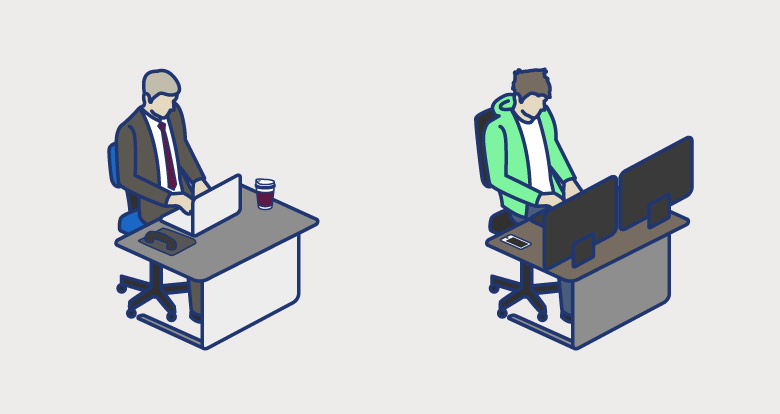
As part of their 'More Good Days At Work' initiative some years ago, Samsung published data from a survey carried out by Censuswide, polling over 1,000 office workers across the UK from businesses comprised of fewer than 250 employees. The poll was concerned with workplace grievances and how damaging they are to small businesses. The overall finding was that employee irritation stacks up to a costly 5.5 hours of weekly productivity erosion.
Being as mine is as small as businesses get - a one-man remote-working freelance operation - I thought it might be fun to poll myself on the same criteria to deduce if I, statistically, am more or less productive than an average small business.
I should clarify, the initial poll ran in 2016 which is when I started composing this post (it's taken me quite a while to get around to completing it), therefore Covid circumstances aren't reflected in the data, which I'll address again later in this piece.
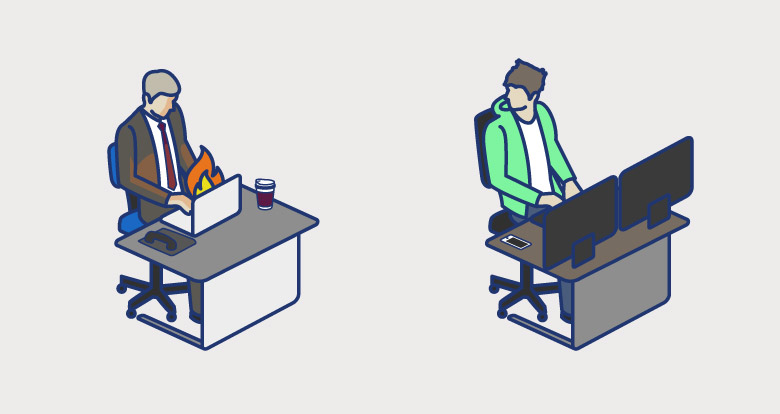
According to the findings 92% of those polled placed computer crashing as one of their primary work day annoyances, and 92% placed slow internet speeds as another. Combined, these hindrances equated to 27 minutes of daily suspension to workplace productivity.
27 minutes. A day. That's half an hour, rounded, of people sat staring expectantly at their lifeless hardware and achieving precisely nothing.
27 minutes. A day. That's half an hour, rounded, of people sat staring expectantly at their lifeless hardware and achieving precisely nothing.
How does my business compare? I too find it irritating when my computer crashes mid-way through an operation but it happens so rarely that on average it equates to around once a year. And if my system does crash, it only sets me back around a minute and a half reboot time. I also rarely lose data in this event as I habitually save my work so frequently. The broadband speed is also pretty consistent here in my office, slowed only marginally when the neighbouring company (my wife working from home) are also doing something intensive on the network.
All things considered the troubles I face with my workplace technology in these respects average out to around 4 minutes downtime a day - less than 8% of the quoted figure experienced by a small business. I suppose the takeaway here is that the more computers there are, the more likely they will malfunction and ruin everyone's day.
All things considered the troubles I face with my workplace technology in these respects average out to around 4 minutes downtime a day - less than 8% of the quoted figure experienced by a small business. I suppose the takeaway here is that the more computers there are, the more likely they will malfunction and ruin everyone's day.
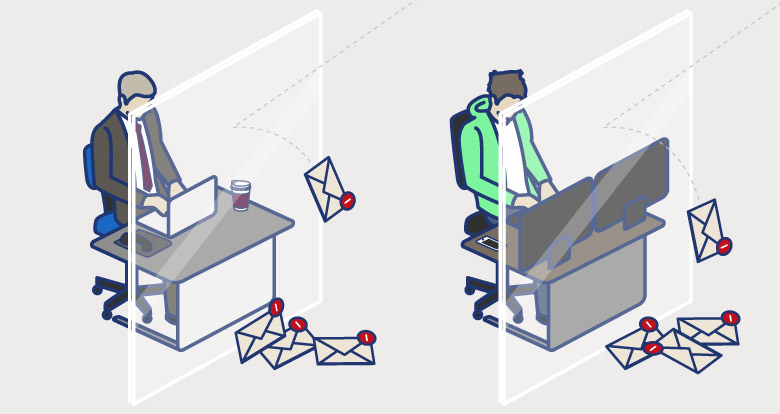
The report found that another technological factor contributing to wasted time was inability to access emails, of which 85% of those polled felt was a top concern. Eighty five percent! That's over three quarters of the UK small business workforce succumbing to the frustrating inability to communicate with one another electronically. To the best of everyone's abilities, valiant efforts to continue working are still made during such email blackouts, but the atmosphere is thick with uncertainty and giddiness, as though an air raid siren had recently sounded. If the company's phones are VOIP systems rather than conventional landlines and therefore have also gone offline, there may also be a chorus of people repeatedly slamming down receivers as they continuously forget that along with email, they too aren't working. It also isn't long before the number of casualties with strained thumbs from over-twiddling also sharply rises.
I'd wager that the catalyst behind this high email deficiency statistic stems from complications with third party networking platforms such as Google Workspace or Office 365. When a company grows to a certain size it attempts to streamline all email activity by enrolling its employees into a single networked application, which these days are increasingly web-based. The further away from conventional standalone email setup these applications become, the greater the likelihood a problem can occur that locks out the entire user base, with show-stopping effect.
I'd wager that the catalyst behind this high email deficiency statistic stems from complications with third party networking platforms such as Google Workspace or Office 365. When a company grows to a certain size it attempts to streamline all email activity by enrolling its employees into a single networked application, which these days are increasingly web-based. The further away from conventional standalone email setup these applications become, the greater the likelihood a problem can occur that locks out the entire user base, with show-stopping effect.
Emailing in my business is significantly low-tech by comparison, right down to accessing messages directly from the host server if needs be. Essentially it's just me at my desk with digital in and out trays, so with such little complexity involved, the window for error is only slightly ajar. I am however wholly dependent on my hosting provider who, as the years have gone by, have indulged in the practise of siphoning off quality of service whilst piling on the fees I'm charged. On more than one occasion my host has dropped the ball in a big way resulting in a catastrophe of simultaneous email and website failure, so I'm far from impervious to computer system issues. Regardless of business size we are all susceptible to our efficiency taking a beating in this category. Let's call that one a tie.

22 minutes of every day is frittered away on distraction from colleagues in the form of moaning (87% felt strongly about this), eating loudly and/or messily (83% felt strongly about this) and interrupting whilst talking (80% felt strongly about this). I've just looked around my office to ask any of my colleagues how they felt about all of those matters and alas, they don't exist. It's just me, head down, concentrating, moaning as incessantly as I want and eating at whatever volume I please. My workflow isn't at all jeopardised by the unpleasant practise of having coworkers.
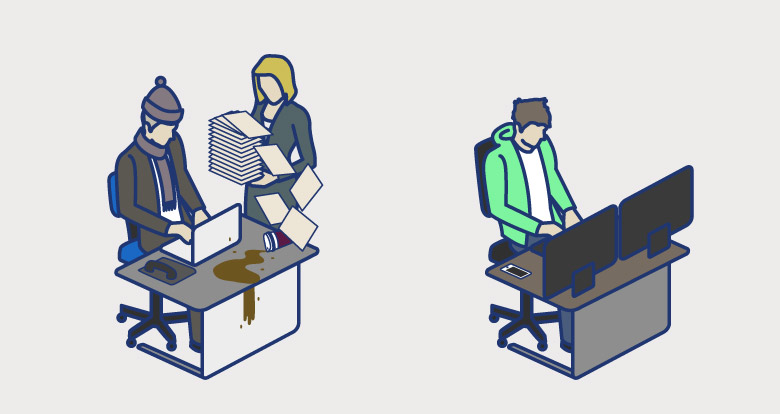
Finally, the survey found that 19 minutes of the small business working day is spent by workers being too hot or too cold, workers not being comfortable on their chairs, and other workers messing up their work spaces. 19 whole minutes, every day, of the collective workforce unable to perform their tasks because they're wrenching their heads off their desks under the weight of icicles forming on their faces, or they're constantly having to douse themselves in cool water for fear of spontaneously combusting, or they're cursing into the heavens as their buttocks' are pulverised by ergonomically inadequate furniture, or they simply can't find their workstations amid the towers of detritus and stationery looming all around them. These seem like amazingly trivial things to be costing small businesses 19 minutes worth of productivity a day. How can you in all good conscience attribute your lack of productivity for a third of an hour to having a lumpy chair? You know what happens in my organisation when the company chair is no longer fit for purpose? I buy me a new one. I have a pretty streamlined operation when it comes to self-sufficiency. If I am too hot, I have a choice of two windows that I can open to encourage a breeze into the space. If I am too cold I can identify which of those windows is open and close it. There's none of this asking-if-anyone-minds-if-I-adjust-the-air-con nonsense, I just get stuck in, toggling fenestration. And as for mountains of clutter consuming my desk - what clutter? I'm a designer! Everything is neat, fastidiously aesthetic and organised for optimum daily arse-kicking.
So there you have it; more bodies, more problems. Point for point the freelancer comes out essentially on top here for efficiency in every category, largely bereft of time-sucking irritation. The freelancer is in total control of his environment, his IT setup is as simplistic as it can be, he is entirely absolved of office bureaucracy and ultimately he is the measure of his own success.
Having already emerged the clear victor against this study there really is no need for me to progress to a sudden death round, but as I am particularly facetious here's how I come out against some of the other irritations not covered by the Censuswide poll.
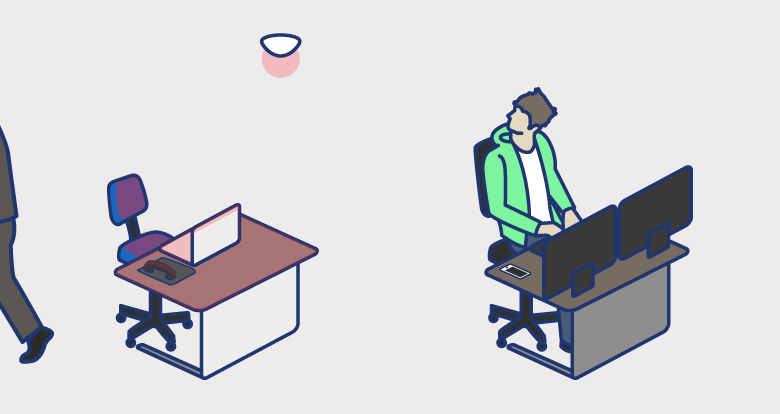
Fire drills/false alarms - not for freelancers, thanks. If the fire alarm were to go off in my gaff you wouldn't find me traipsing begrudgingly up the road and then standing outside my bewildered neighbour's houses, pondering aloud which of the spoons my wife may have inadvertently microwaved. I'd be wafting a magazine at the sensor until the burnt toast aroma had dissipated.
My estimation is that across a year a small business may well lose an entire day to being trained in car park loitering, waiting to be allowed to back inside to continue work.
My estimation is that across a year a small business may well lose an entire day to being trained in car park loitering, waiting to be allowed to back inside to continue work.
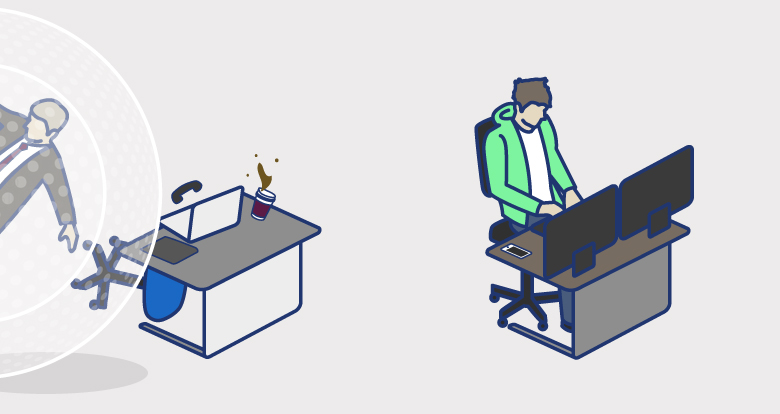
Management mandated off-site Team Building days - my team's pretty much already built. Don't get me wrong, I do possess the authority to instruct myself to down tools and head out to a field to throw a frisbee around, or don an oversized rubber ball costume and roll down a hill, but I already know myself and work well with myself, so a day off for corporate-endorsed jollies has no place coming between me and my workload.
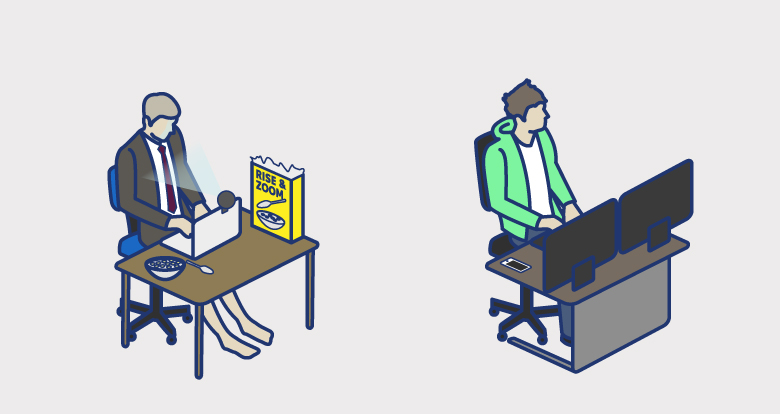
Internal meetings - very literal in my case. In a small business an employee's annual productivity is slashed irrevocably owing to sitting in rooms with teams of people - the very same people they sit beside outside those rooms - to discuss everything they need to achieve once they return to wherever it is they normally sit. As this can occur multiple times a day across the week, and can range in emotion from confusion to fury, my estimation is the frequency and morale damage of internal meetings reduces small business productivity by around 8 billion percent, give or take.
By contrast, all my internal meetings occur amongst my own neurons whenever I feel like rallying them, hampering precisely zero percent of my actual working efficiency.
By contrast, all my internal meetings occur amongst my own neurons whenever I feel like rallying them, hampering precisely zero percent of my actual working efficiency.
***
While this piece set out to be a not-to-be-taken-too-seriously commentary on office culture, observing a dataset which predates the Covid workspace landscape, I appreciate the humour in it may no longer translate and the bulk of the observations made are now moot.
Workers based remotely are no longer within close enough proximity to irritate each other with temperature disputes, unpleasant food or distracting behaviour. Internal meetings have been reimagined with the help of Zoom (who report that during the peak of lockdown adoption the software saw its usage increase by 2,900% - that's 300 million meeting rooms gathering each day). In terms of productivity, the absence of a physical collaboration space has perhaps lightened the irritation load to in turn boost individual efficiency, but likely has introduced a raft of new irritations borne from working at home, including even more meetings than before, little-to-no adequate working conditions, and coworker distractions replaced by those from partners, children and pets. It's likely that productive output for those small businesses who have even been able to continue trading at all, has plunged to record lows.
Despite already having put in the years developing a functional space at home and working processes to successfully conduct business, even I have felt the ripples of lockdown travesty in a number of detrimental ways. In short, given the climate and attitude, I felt it would be unfair to leave this piece with a disingenuous wry smirk without acknowledging how the playing field has been tainted, and that were the Censuswide poll on productivity-destroying catalysts conducted today, the parity in experiences between displaced small businesses and freelancers would definitely have more overlap in the data.
Want to read blog updates as they're published? Sign up to my newsletter for blog update alerts. Join my newsletter

 T-shirt challenge
T-shirt challenge